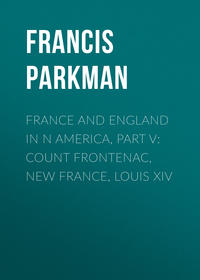 полная версия
полная версияFrance and England in N America, Part VII, Vol 1: A Half-Century of Conflict
Heavy snows had lately fallen and buried the clearings, the meadow, and the frozen river to the depth of full three feet. On the northwestern side the drifts were piled nearly to the top of the palisade fence, so that it was no longer an obstruction to an active enemy.
As the afternoon waned, the sights and sounds of the little border hamlet were, no doubt, like those of any other rustic New England village at the end of a winter day,—an ox-sledge creaking on the frosty snow as it brought in the last load of firewood, boys in homespun snowballing one another in the village street, farmers feeding their horses and cattle in the barns, a matron drawing a pail of water with the help of one of those long well-sweeps still used in some remote districts, or a girl bringing a pail of milk from the cow-shed. In the houses, where one room served as kitchen, dining-room, and parlor, the housewife cooked the evening meal, children sat at their bowls of mush and milk, and the men of the family, their day's work over, gathered about the fire, while perhaps some village coquette sat in the corner with fingers busy at the spinning-wheel, and ears intent on the stammered wooings of her rustic lover. Deerfield kept early hours, and it is likely that by nine o'clock all were in their beds. There was a patrol inside the palisade, but there was little discipline among these extemporized soldiers; the watchers grew careless as the frosty night went on; and it is said that towards morning they, like the villagers, betook themselves to their beds.
Rouville and his men, savage with hunger, lay shivering under the pines till about two hours before dawn; then, leaving their packs and their snow-shoes behind, they moved cautiously towards their prey. There was a crust on the snow strong enough to bear their weight, though not to prevent a rustling noise as it crunched under the feet of so many men. It is said that from time to time Rouville commanded a halt, in order that the sentinels, if such there were, might mistake the distant sound for rising and falling gusts of wind. In any case, no alarm was given till they had mounted the palisade and dropped silently into the unconscious village. Then with one accord they screeched the war-whoop, and assailed the doors of the houses with axes and hatchets.
The hideous din startled the minister, Williams, from his sleep. Half-wakened, he sprang out of bed, and saw dimly a crowd of savages bursting through the shattered door. He shouted to two soldiers who were lodged in the house; and then, with more valor than discretion, snatched a pistol that hung at the head of the bed, cocked it, and snapped it at the breast of the foremost Indian, who proved to be a Caughnawaga chief. It missed fire, or Williams would, no doubt, have been killed on the spot. Amid the screams of his terrified children, three of the party seized him and bound him fast; for they came well provided with cords, since prisoners had a market value. Nevertheless, in the first fury of their attack they dragged to the door and murdered two of the children and a negro woman called Parthena, who was probably their nurse. In an upper room lodged a young man named Stoddard, who had time to snatch a cloak, throw himself out of the window, climb the palisade, and escape in the darkness. Half-naked as he was, he made his way over the snow to Hatfield, binding his bare feet with strips torn from the cloak.
They kept Williams shivering in his shirt for an hour while a frightful uproar of yells, shrieks, and gunshots sounded from without. At length they permitted him, his wife, and five remaining children to dress themselves. Meanwhile the Indians and their allies burst into most of the houses, killed such of the men as resisted, butchered some of the women and children, and seized and bound the rest. Some of the villagers escaped in the confusion, like Stoddard, and either fled half dead with cold towards Hatfield, or sought refuge in the fortified house of Jonathan Wells.
The house of Stebbins, the minister's next neighbor, had not been attacked so soon as the rest, and the inmates had a little time for preparation. They consisted of Stebbins himself, with his wife and five children, David Hoyt, Joseph Catlin, Benjamin Church, a namesake of the old Indian fighter of Philip's War, and three other men,—probably refugees who had brought their wives and families within the palisaded enclosure for safety. Thus the house contained seven men, four or five women, and a considerable number of children. Though the walls were bullet-proof, it was not built for defence. The men, however, were well supplied with guns, powder, and lead, and they seem to have found some means of barricading the windows. When the enemy tried to break in, they drove them back with loss. On this, the French and Indians gathered in great numbers before the house, showered bullets upon it, and tried to set it on fire. They were again repulsed, with the loss of several killed and wounded; among the former a Caughnawaga chief, and among the latter a French officer. Still the firing continued. If the assailants had made a resolute assault, the defenders must have been overpowered; but to risk lives in open attack was contrary to every maxim of forest warfare. The women in the house behaved with great courage, and moulded bullets, which the men shot at the enemy. Stebbins was killed outright, and Church was wounded, as was also the wife of David Hoyt. At length most of the French and Indians, disgusted with the obstinacy of the defence, turned their attention to other quarters; though some kept up their fire under cover of the meeting-house and another building within easy range of gunshot.
This building was the house of Ensign John Sheldon, already mentioned. The Indians had had some difficulty in mastering it; for the door being of thick oak plank, studded with nails of wrought iron and well barred, they could not break it open. After a time, however, they hacked a hole in it, through which they fired and killed Mrs. Sheldon as she sat on the edge of a bed in a lower room. Her husband, a man of great resolution, seems to have been absent. Their son John, with Hannah his wife, jumped from an upper chamber window. The young woman sprained her ankle in the fall, and lay helpless, but begged her husband to run to Hatfield for aid, which he did, while she remained a prisoner. The Indians soon got in at a back door, seized Mercy Sheldon, a little girl of two years, and dashed out her brains on the door-stone. Her two brothers and her sister Mary, a girl of sixteen, were captured. The house was used for a short time as a depot for prisoners, and here also was brought the French officer wounded in the attack on the Stebbins house. A family tradition relates that as he lay in great torment he begged for water, and that it was brought him by one of the prisoners, Mrs. John Catlin, whose husband, son, and infant grandson had been killed, and who, nevertheless, did all in her power to relieve the sufferings of the wounded man. Probably it was in recognition of this charity that when the other prisoners were led away, Mrs. Catlin was left behind. She died of grief a few weeks later.
The sun was scarcely an hour high when the miserable drove of captives was conducted across the river to the foot of a mountain or high hill. Williams and his family were soon compelled to follow, and his house was set on fire. As they led him off he saw that other houses within the palisade were burning, and that all were in the power of the enemy except that of his neighbor Stebbins, where the gallant defenders still kept their assailants at bay. Having collected all their prisoners, the main body of the French and Indians began to withdraw towards the pine forest, where they had left their packs and snow-shoes, and to prepare for a retreat before the country should be roused, first murdering in cold blood Marah Carter, a little girl of five years, whom they probably thought unequal to the march. Several parties, however, still lingered in the village, firing on the Stebbins house, killing cattle, hogs, and sheep, and gathering such plunder as the place afforded.
Early in the attack, and while it was yet dark, the light of burning houses, reflected from the fields of snow, had been seen at Hatfield, Hadley, and Northampton. The alarm was sounded through the slumbering hamlets, and parties of men mounted on farm-horses, with saddles or without, hastened to the rescue, not doubting that the fires were kindled by Indians. When the sun was about two hours high, between thirty and forty of them were gathered at the fortified house of Jonathan Wells, at the southern end of the village. The houses of this neighborhood were still standing, and seem not to have been attacked,—the stubborn defence of the Stebbins house having apparently prevented the enemy from pushing much beyond the palisaded enclosure. The house of Wells was full of refugee families. A few Deerfield men here joined the horsemen from the lower towns, as also did four or five of the yeoman soldiers who had escaped the fate of most of their comrades. The horsemen left their horses within Wells's fence; he himself took the lead, and the whole party rushed in together at the southern gate of the palisaded enclosure, drove out the plunderers, and retook a part of their plunder. The assailants of the Stebbins house, after firing at it for three hours, were put to flight, and those of its male occupants who were still alive joined their countrymen, while the women and children ran back for harborage to the house of Wells.
Wells and his men, now upwards of fifty, drove the flying enemy more than a mile across the river meadows, and ran in headlong pursuit over the crusted snow, killing a considerable number. In the eagerness of the chase many threw off their overcoats, and even their jackets. Wells saw the danger, and vainly called on them to stop. Their blood was up, and most of them were young and inexperienced.
Meanwhile the firing at the village had been heard by Rouville's main body, who had already begun their retreat northward. They turned back to support their comrades, and hid themselves under the bank of the river till the pursuers drew near, when they gave them a close volley and rushed upon them with the war-whoop. Some of the English were shot down, and the rest driven back. There was no panic. "We retreated," says Wells, "facing about and firing." When they reached the palisade they made a final stand, covering by their fire such of their comrades as had fallen within range of musket-shot, and thus saving them from the scalping-knife. The French did not try to dislodge them. Nine of them had been killed, several were wounded, and one was captured.59
The number of English carried off prisoners was one hundred and eleven, and the number killed was according to one list forty-seven, and according to another fifty-three, the latter including some who were smothered in the cellars of their burning houses. The names, and in most cases the ages, of both captives and slain are preserved. Those who escaped with life and freedom were, by the best account, one hundred and thirty-seven. An official tabular statement, drawn up on the spot, sets the number of houses burned at seventeen. The house of the town clerk, Thomas French, escaped, as before mentioned, and the town records, with other papers in his charge, were saved. The meeting-house also was left standing. The house of Sheldon was hastily set on fire by the French and Indians when their rear was driven out of the village by Wells and his men; but the fire was extinguished, and "the Old Indian House," as it was called, stood till the year 1849. Its door, deeply scarred with hatchets, and with a hole cut near the middle, is still preserved in the Memorial Hall at Deerfield.60
Vaudreuil wrote to the minister, Ponchartrain, that the French lost two or three killed, and twenty or twenty-one wounded, Rouville himself being among the latter. This cannot include the Indians, since there is proof that the enemy left behind a considerable number of their dead. Wherever resistance was possible, it had been of the most prompt and determined character.61
Long before noon the French and Indians were on their northward march with their train of captives. More armed men came up from the settlements below, and by midnight about eighty were gathered at the ruined village. Couriers had been sent to rouse the country, and before evening of the next day (the first of March) the force at Deerfield was increased to two hundred and fifty; but a thaw and a warm rain had set in, and as few of the men had snow-shoes, pursuit was out of the question. Even could the agile savages and their allies have been overtaken, the probable consequence would have been the murdering of the captives to prevent their escape.
In spite of the foul blow dealt upon it, Deerfield was not abandoned. Such of its men as were left were taken as soldiers into the pay of the province, while the women and children were sent to the villages below. A small garrison was also stationed at the spot, under command of Captain Jonathan Wells, and thus the village held its ground till the storm of war should pass over.62
We have seen that the minister, Williams, with his wife and family, were led from their burning house across the river to the foot of the mountain, where the crowd of terrified and disconsolate captives—friends, neighbors, and relatives—were already gathered. Here they presently saw the fight in the meadow, and were told that if their countrymen attempted a rescue, they should all be put to death. "After this," writes Williams, "we went up the mountain, and saw the smoke of the fires in town, and beheld the awful desolation of Deerfield; and before we marched any farther they killed a sucking child of the English."
The French and Indians marched that afternoon only four or five miles,—to Greenfield meadows,—where they stopped to encamp, dug away the snow, laid spruce-boughs on the ground for beds, and bound fast such of the prisoners as seemed able to escape. The Indians then held a carousal on some liquor they had found in the village, and in their drunken rage murdered a negro man belonging to Williams. In spite of their precautions, Joseph Alexander, one of the prisoners, escaped during the night, at which they were greatly incensed; and Rouville ordered Williams to tell his companions in misfortune that if any more of them ran off, the rest should be burned alive.63
The prisoners were the property of those who had taken them. Williams had two masters, one of the three who had seized him having been shot in the attack on the house of Stebbins. His principal owner was a surly fellow who would not let him speak to the other prisoners; but as he was presently chosen to guard the rear, the minister was left in the hands of his other master, who allowed him to walk beside his wife and help her on the way. Having borne a child a few weeks before, she was in no condition for such a march, and felt that her hour was near. Williams speaks of her in the strongest terms of affection. She made no complaint, and accepted her fate with resignation. "We discoursed," he says, "of the happiness of those who had God for a father and friend, as also that it was our reasonable duty quietly to submit to his will." Her thoughts were for her remaining children, whom she commended to her husband's care. Their intercourse was short. The Indian who had gone to the rear of the train soon returned, separated them, ordered Williams to the front, "and so made me take a last farewell of my dear wife, the desire of my eyes and companion in many mercies and afflictions." They came soon after to Green River, a stream then about knee-deep, and so swift that the water had not frozen. After wading it with difficulty, they climbed a snow-covered hill beyond. The minister, with strength almost spent, was permitted to rest a few moments at the top; and as the other prisoners passed by in turn, he questioned each for news of his wife. He was not left long in suspense. She had fallen from weakness in fording the stream, but gained her feet again, and, drenched in the icy current, struggled to the farther bank, when the savage who owned her, finding that she could not climb the hill, killed her with one stroke of his hatchet. Her body was left on the snow till a few of her townsmen, who had followed the trail, found it a day or two after, carried it back to Deerfield, and buried it in the churchyard.
On the next day the Indians killed an infant and a little girl of eleven years; on the day following, Friday, they tomahawked a woman, and on Saturday four others. This apparent cruelty was in fact a kind of mercy. The victims could not keep up with the party, and the death-blow saved them from a lonely and lingering death from cold and starvation. Some of the children, when spent with the march, were carried on the backs of their owners,—partly, perhaps, through kindness, and partly because every child had its price.
On the fourth day of the march they came to the mouth of West River, which enters the Connecticut a little above the present town of Brattleboro'. Some of the Indians were discontented with the distribution of the captives, alleging that others had got more than their share; on which the whole troop were mustered together, and some changes of ownership were agreed upon. At this place dog-trains and sledges had been left, and these served to carry their wounded, as well as some of the captive children. Williams was stripped of the better part of his clothes, and others given him instead, so full of vermin that they were a torment to him through all the journey. The march now continued with pitiless speed up the frozen Connecticut, where the recent thaw had covered the ice with slush and water ankle-deep.
On Sunday they made a halt, and the minister was permitted to preach a sermon from the text, "Hear, all people, and behold my sorrow: my virgins and my young men are gone into captivity." Then amid the ice, the snow, the forest, and the savages, his forlorn flock joined their voices in a psalm.64 On Monday guns were heard from the rear, and the Indians and their allies, in great alarm, bound their prisoners fast, and prepared for battle. It proved, however, that the guns had been fired at wild geese by some of their own number; on which they recovered their spirits, fired a volley for joy, and boasted that the English could not overtake them.65 More women fainted by the way and died under the hatchet,—some with pious resignation, some with despairing apathy, some with a desperate joy.
Two hundred miles of wilderness still lay between them and the Canadian settlements. It was a waste without a house or even a wigwam, except here and there the bark shed of some savage hunter. At the mouth of White River, the party divided into small bands,—no doubt in order to subsist by hunting, for provisions were fast failing. The Williams family were separated. Stephen was carried up the Connecticut; Samuel and Eunice, with two younger children, were carried off in various directions; while the wretched father, along with two small children of one of his parishioners, was compelled to follow his Indian masters up the valley of White River. One of the children—a little girl—was killed on the next morning by her Caughnawaga owner, who was unable to carry her.66 On the next Sunday the minister was left in camp with one Indian and the surviving child,—a boy of nine,—while the rest of the party were hunting. "My spirit," he says, "was almost overwhelmed within me." But he found comfort in the text, "Leave thy fatherless children, I will preserve them alive." Nor was his hope deceived. His youngest surviving child,—a boy of four,—though harshly treated by his owners, was carried on their shoulders or dragged on a sledge to the end of the journey. His youngest daughter—seven years old—was treated with great kindness throughout. Samuel and Eunice suffered much from hunger, but were dragged on sledges when too faint to walk. Stephen nearly starved to death; but after eight months in the forest, he safely reached Chambly with his Indian masters.
Of the whole band of captives, only about half ever again saw friends and home. Seventeen broke down on the way and were killed; while David Hoyt and Jacob Hix died of starvation at Coos Meadows, on the upper Connecticut. During the entire march, no woman seems to have been subjected to violence; and this holds true, with rare exceptions, in all the Indian wars of New England. This remarkable forbearance towards female prisoners, so different from the practice of many western tribes, was probably due to a form of superstition, aided perhaps by the influence of the missionaries.67 It is to be observed, however, that the heathen savages of King Philip's War, who had never seen a Jesuit, were no less forbearing in this respect.
The hunters of Williams's party killed five moose, the flesh of which, smoked and dried, was carried on their backs and that of the prisoner whom they had provided with snow-shoes. Thus burdened, the minister toiled on, following his masters along the frozen current of White River till, crossing the snowy backs of the Green Mountains, they struck the headwaters of the stream then called French River, now the Winooski, or Onion. Being in great fear of a thaw, they pushed on with double speed. Williams was not used to snow-shoes, and they gave him those painful cramps of the legs and ankles called in Canada mal à la raquette. One morning at dawn he was waked by his chief master and ordered to get up, say his prayers, and eat his breakfast, for they must make a long march that day. The minister was in despair. "After prayer," he says, "I arose from my knees; but my feet were so tender, swollen, bruised, and full of pain that I could scarce stand upon them without holding on the wigwam. And when the Indians said, 'You must run to-day,' I answered I could not run. My master, pointing to his hatchet, said to me, 'Then I must dash out your brains and take your scalp.'" The Indian proved better than his word, and Williams was suffered to struggle on as he could. "God wonderfully supported me," he writes, "and my strength was restored and renewed to admiration." He thinks that he walked that day forty miles on the snow. Following the Winooski to its mouth, the party reached Lake Champlain a little north of the present city of Burlington. Here the swollen feet of the prisoner were tortured by the rough ice, till snow began to fall and cover it with a soft carpet. Bending under his load, and powdered by the falling flakes, he toiled on till, at noon of a Saturday, lean, tired, and ragged, he and his masters reached the French outpost of Chambly, twelve or fifteen miles from Montreal.
Here the unhappy wayfarer was treated with great kindness both by the officers of the fort and by the inhabitants, one of the chief among whom lodged him in his house and welcomed him to his table. After a short stay at Chambly, Williams and his masters set out in a canoe for Sorel. On the way a Frenchwoman came down to the bank of the river and invited the party to her house, telling the minister that she herself had once been a prisoner among the Indians, and knew how to feel for him. She seated him at a table, spread a table-cloth, and placed food before him, while the Indians, to their great indignation, were supplied with a meal in the chimney-corner. Similar kindness was shown by the inhabitants along the way till the party reached their destination, the Abenaki village of St. Francis, to which his masters belonged. Here there was a fort, in which lived two Jesuits, directors of the mission, and here Williams found several English children, captured the summer before during the raid on the settlements of Maine, and already transformed into little Indians both in dress and behavior. At the gate of the fort one of the Jesuits met him, and asked him to go into the church and give thanks to God for sparing his life, to which he replied that he would give thanks in some other place. The priest then commanded him to go, which he refused to do. When on the next day the bell rang for mass, one of his Indian masters seized him and dragged him into the church, where he got behind the door, and watched the service from his retreat with extreme disapprobation. One of the Jesuits telling him that he would go to hell for not accepting the apostolic traditions, and trusting only in the Bible, he replied that he was glad to know that Christ was to be his judge, and not they. His chief master, who was a zealot in his way, and as much bound to the rites and forms of the Church as he had been before his conversion to his "medicines," or practices of heathen superstition, one day ordered him to make the sign of the cross, and on his refusal, tried to force him. But as the minister was tough and muscular, the Indian could not guide his hand. Then, pulling out a crucifix that hung at his neck, he told Williams in broken English to kiss it; and being again refused, he brandished his hatchet over him and threatened to knock out his brains. This failing of the desired effect, he threw down the hatchet and said he would first bite out the minister's finger-nails,—a form of torture then in vogue among the northern Indians, both converts and heathen. Williams offered him a hand and invited him to begin; on which he gave the thumb-nail a gripe with his teeth, and then let it go, saying, "No good minister, bad as the devil." The failure seems to have discouraged him, for he made no further attempt to convert the intractable heretic.







